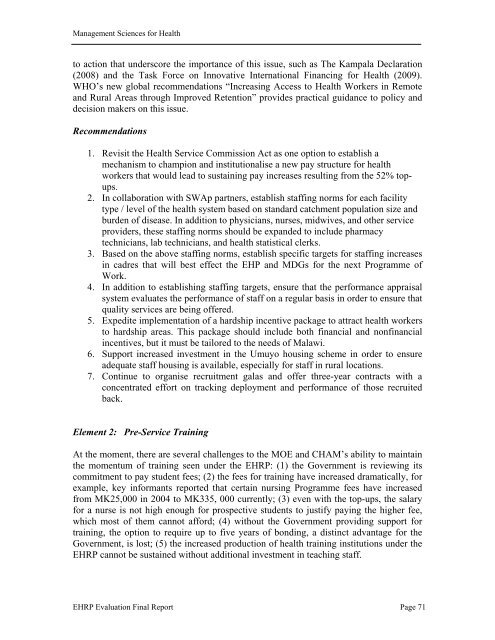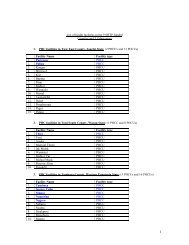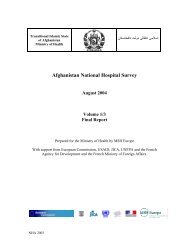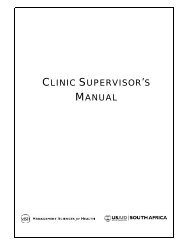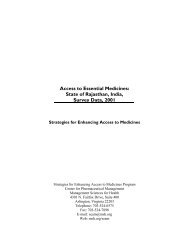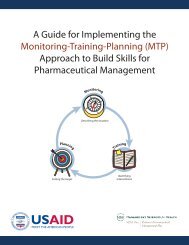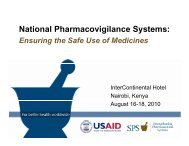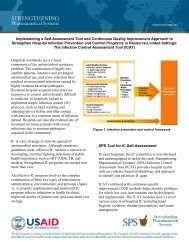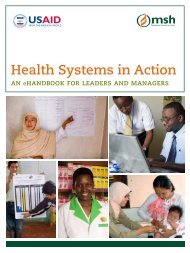Evaluation of Malawi's Emergency Human Resources Programme
Evaluation of Malawi's Emergency Human Resources Programme
Evaluation of Malawi's Emergency Human Resources Programme
Create successful ePaper yourself
Turn your PDF publications into a flip-book with our unique Google optimized e-Paper software.
Management Sciences for Health<br />
to action that underscore the importance <strong>of</strong> this issue, such as The Kampala Declaration<br />
(2008) and the Task Force on Innovative International Financing for Health (2009).<br />
WHO’s new global recommendations “Increasing Access to Health Workers in Remote<br />
and Rural Areas through Improved Retention” provides practical guidance to policy and<br />
decision makers on this issue.<br />
Recommendations<br />
1. Revisit the Health Service Commission Act as one option to establish a<br />
mechanism to champion and institutionalise a new pay structure for health<br />
workers that would lead to sustaining pay increases resulting from the 52% topups.<br />
2. In collaboration with SWAp partners, establish staffing norms for each facility<br />
type / level <strong>of</strong> the health system based on standard catchment population size and<br />
burden <strong>of</strong> disease. In addition to physicians, nurses, midwives, and other service<br />
providers, these staffing norms should be expanded to include pharmacy<br />
technicians, lab technicians, and health statistical clerks.<br />
3. Based on the above staffing norms, establish specific targets for staffing increases<br />
in cadres that will best effect the EHP and MDGs for the next <strong>Programme</strong> <strong>of</strong><br />
Work.<br />
4. In addition to establishing staffing targets, ensure that the performance appraisal<br />
system evaluates the performance <strong>of</strong> staff on a regular basis in order to ensure that<br />
quality services are being <strong>of</strong>fered.<br />
5. Expedite implementation <strong>of</strong> a hardship incentive package to attract health workers<br />
to hardship areas. This package should include both financial and nonfinancial<br />
incentives, but it must be tailored to the needs <strong>of</strong> Malawi.<br />
6. Support increased investment in the Umuyo housing scheme in order to ensure<br />
adequate staff housing is available, especially for staff in rural locations.<br />
7. Continue to organise recruitment galas and <strong>of</strong>fer three-year contracts with a<br />
concentrated effort on tracking deployment and performance <strong>of</strong> those recruited<br />
back.<br />
Element 2: Pre-Service Training<br />
At the moment, there are several challenges to the MOE and CHAM’s ability to maintain<br />
the momentum <strong>of</strong> training seen under the EHRP: (1) the Government is reviewing its<br />
commitment to pay student fees; (2) the fees for training have increased dramatically, for<br />
example, key informants reported that certain nursing <strong>Programme</strong> fees have increased<br />
from MK25,000 in 2004 to MK335, 000 currently; (3) even with the top-ups, the salary<br />
for a nurse is not high enough for prospective students to justify paying the higher fee,<br />
which most <strong>of</strong> them cannot afford; (4) without the Government providing support for<br />
training, the option to require up to five years <strong>of</strong> bonding, a distinct advantage for the<br />
Government, is lost; (5) the increased production <strong>of</strong> health training institutions under the<br />
EHRP cannot be sustained without additional investment in teaching staff.<br />
EHRP <strong>Evaluation</strong> Final Report Page 71


